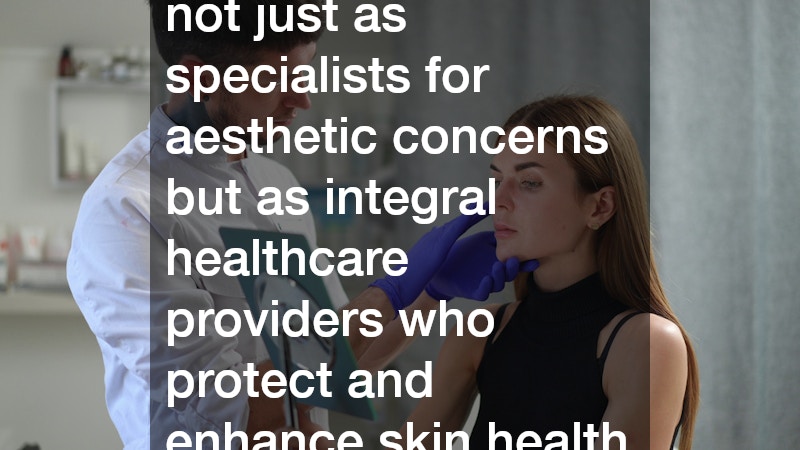Dermatologists are often misunderstood, with numerous misconceptions clouding the public’s perception of what they do and how they help patients. From assuming their work is purely cosmetic to believing anyone can manage skin issues with online advice, these myths not only undermine the medical expertise of dermatologists but can also put people’s health at risk.
It’s time to set the record straight by debunking six common myths about dermatologists and revealing the truth about their vital role in healthcare.
Myth 1: Dermatologists Only Treat Acne & Wrinkles
One of the most persistent myths is that dermatologists exclusively treat acne in teenagers or provide anti-ageing solutions for adults. While these are certainly aspects of their work, the scope of dermatology is much broader. Dermatologists are trained medical professionals who diagnose and treat more than 3,000 skin conditions, ranging from chronic diseases like eczema and psoriasis to life-threatening issues such as skin cancer. They also manage conditions affecting the hair and nails, making their expertise indispensable for patients of all ages. Their knowledge extends well beyond skincare trends, incorporating advanced medical training and diagnostic tools that support accurate assessments and effective treatments.
Myth 2: You Only Need to See a Dermatologist for Skin Problems
Many people believe a dermatologist is only necessary if there’s a visible skin issue, such as a rash or breakout. However, dermatologists also play a preventative role in long-term skin health. They can assess moles for early signs of melanoma, educate patients about sun protection and identify systemic conditions that first present with dermatological symptoms. For instance, autoimmune disorders, nutritional deficiencies and even internal cancers can show early signs on the skin. Regular skin checks with a dermatologist can lead to early detection of serious conditions and significantly improve outcomes.
Myth 3: All Skin Treatments Can Be Done at a Beauty Salon
With the increasing popularity of beauty salons offering chemical peels, microdermabrasion and laser treatments, many consumers assume there’s little difference between cosmetic procedures performed at a salon and those administered by dermatologists. This assumption can be dangerously misleading. Dermatologists are medically trained to understand skin structure, healing responses and the potential complications of various treatments. They are equipped to handle adverse reactions, assess suitability for procedures and ensure hygiene and safety protocols are upheld. Unlike salon staff, dermatologists base their decisions on clinical evidence and individual patient needs, which dramatically reduces the risk of harm.
Myth 4: Dermatologists Are Too Expensive for Everyday Concerns
There’s a widespread belief that dermatologists are only for the wealthy or that their services are a luxury rather than a necessity. In truth, many dermatologists work in public hospitals and clinics where services are subsidised or covered by Medicare. Additionally, some private dermatologists offer consultations for common conditions such as dermatitis, rosacea, or fungal infections and these visits can often be claimed in part through private health insurance. Seeking early professional help can also prevent more serious complications, making it a cost-effective choice in the long run. Delaying care or using ineffective over-the-counter products can worsen skin issues and increase treatment costs later.
Myth 5: Anyone Can Give Skin Advice Online—It’s All the Same
With the rise of social media influencers and online skincare gurus, it’s easy to believe that glowing skin can be achieved by following general advice or copying someone else’s routine. However, skin type, underlying health conditions, allergies and genetics all play crucial roles in how an individual responds to certain products or regimens. Dermatologists are trained to tailor treatments to each patient’s unique needs. Their advice is grounded in scientific research and clinical trials, not popularity or sponsorships. Misinformation spread online can cause more harm than good, sometimes leading to burns, allergic reactions, or worsening of existing conditions.
Myth 6: Dermatologists Only Prescribe Creams
Another common misconception is that dermatologists rely solely on topical treatments. While prescription creams and ointments are certainly tools in their arsenal, dermatologists also use oral medications, injectable treatments, laser therapies, surgical procedures and phototherapy, depending on the condition. For example, treating a severe case of psoriasis may involve systemic drugs that modulate the immune system. Acne might be treated with antibiotics, hormonal therapies, or isotretinoin in addition to topical solutions. Dermatologists assess each case individually to determine the most appropriate and effective approach, often combining treatments for optimal results.
Understanding the True Role of Dermatologists
Debunking these myths highlights the essential nature of dermatologists within the medical community. Their expertise goes far beyond cosmetic care, encompassing disease prevention, early cancer detection and the management of complex skin, hair and nail disorders. In Australia, where UV exposure significantly raises the risk of skin cancer, the role of dermatologists is even more critical. By recognising the breadth and depth of their work, patients are more likely to seek timely, appropriate care and avoid the pitfalls of misinformation or unqualified advice.
Dermatologists should be viewed not just as specialists for aesthetic concerns but as integral healthcare providers who protect and enhance skin health throughout all stages of life. Their work is both preventative and restorative, offering relief, protection and long-term wellness to their patients. Whether you’re managing a persistent skin condition or simply seeking guidance on healthy skincare practices, consulting a dermatologist is a medically sound decision that ensures your skin receives the best possible care.




